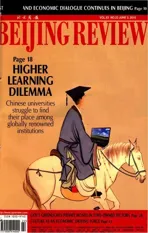The Right Way to Fitness
2010-09-12ByTANGYUANKAI
By TANG YUANKAI
The Right Way to Fitness
By TANG YUANKAI
Physical fitness tests help choose suitable physical activities and diet
Yin Shi and his wife Ding Li fretted over their son’s height. The boy was much shorter than his peers. To make him taller and healthier, the couple fed him all sorts of nutritional food. They could not believe their ears when their doctor told them excessive nutrition was the cause of their son’s relative shortness.
The diagnosis came from a physical ftness survey report. The result of a physical examination for their 13-year-old son indicated his skeletal age was 16 and he was overnourished.
Excessive nutrition can make a young person reach puberty earlier and develop an advanced age of bones, the doctor said. It is possible to predict a child’s future height from his or her current height and skeletal age, and short children with an advanced skeletal age are also more likely to grow into short adults.
It was the frst time Yin and Ding had visited a physical fitness survey center. The one they visited was set up in Beijing 10 years ago.
The center is equipped with various devices to test a person’s physical fitness, such as grip strength, bone density, spine health, body fat composition, reaction and balance.
Those who are tested there are given a comprehensive fitness assessment report based on computer analysis. It grades a person in three areas: physical build (including tests for one’s body shape and nutrition), physiological function (including tests for one’s metabolism and the condition of physical organs such as vital capacity) and physical quality (including tests for one’s strength, speed, endurance, agility, fexibility in playing sports, and some abilities such as walking, running, jumping and throwing). Staff members at the center analyze the report and help their clients set exercise and diet plans to suit their physical conditions.
“Different from a medical examination, a physical ftness survey does not set out to detect disease, but evaluates physical function and abilities, which usually indicates one’s current and future health status,” said An Jianhua, an offcial with an institute on sports sciences of China’s General Administration of Sports (GAS).
The national physical fitness survey is carried out in China every five years. The result of the first survey was published in 2000. Currently, the third such survey is still in progress. The survey aims to gather accurate data necessary to illuminate the design and the implementation of national fitness programs. The survey is conducted through ftness tests and questionnaires.

NUTRITION LESSON: A nutritionist talks tochildren and a school chef about a healthy diet
People who receive such surveys are Chinese citizens aged 3 to 69. They are divided into four age groups: preschoolers, children and adolescents (students), adults and elders.
Statistics from the national physical ftness survey center under the GAS show that, as of May 19, 2010, data from nearly 40,000 persons all across the country had been gathered.
On May 15-16, the GAS and China Sports Science Society hosted a meeting on physical fitness science, the second of its kind in China. At the meeting, sports experts agreed that although more and more people were realizing the importance of physical exercise, many of them did not know that physical exercise did not equate to good health. A scientifc guidance on public physical exercise is urgently needed, experts said.
“Quite a number of Chinese did not know what exercises were suitable for them,” An said, “and doing the wrong exercises may not yield the desired benefts and may even produce negative effects.”
For example, he said, although many people have heard about aerobic exercise, they did not know what it was about. An found some people even mistook exercise done in oxygen-rich environment as aerobic exercise.
Before starting to exercise, one must know his/her own physical condition, An said. Some competitive sports or fashionable fitness programs may not suit everybody. Exercises with too much sports load may induce injury, while exercises with insuffcient sports load may not make you any ftter, he said.
In addition to choosing a suitable sport, proper nutrition is also important to stay ft, said Cao Jianmin, a researcher at Beijing Sport University, who has advised the diet of athletes in China’s national sports teams and engaged in many vital research projects on sports nutrition of the country.“The correct nutrition can add muscle and reduce body fat,”Cao said.
A combination of a healthy lifestyle, proper exercises and a proper diet will boost one’s health and physical ability, he said. “Nowadays, many people think a diet of fruits and high protein foods, such as yogurt, is good enough, and they hate high-carbohydrate foods, such as rice and noodles. That idea is very wrong,” said Cao.
He said apart from adequate amounts of protein, fat and water, carbohydrates are especially important to muscle building.
Carbohydrates are necessary for athletes to achieve good training results and win competitions, and for average people to get the desired results from physical exercises, he said. Bodies store adequate amounts of protein and fat, but limited amounts of carbohydrates. Carbohydrates run down during exercises and need to be replenished. An insuffcient supply will cause muscle fatigue, the expert said.
There is no need for people to worry that increasing carbohydrate intake will cause weight gain. People put on weight when their total calorie intake exceeds the calories burned, so if they cut down on fat intake while eating more carbohydrates, they can keep total calories under control, Cao said.
There are many carbohydrates for people to choose from. “Healthy” carbohydrates are those low in fat, such as grains and potatoes, Cao said.
